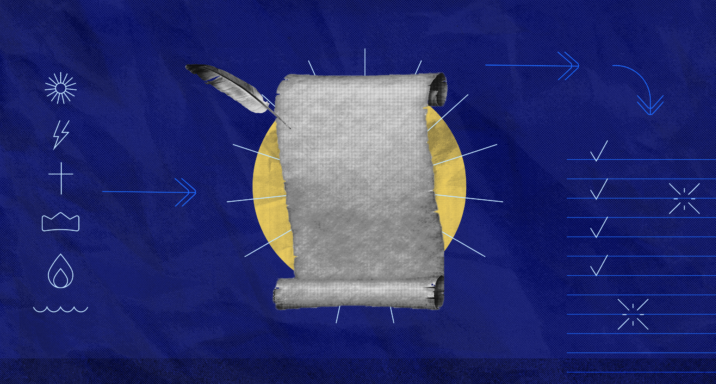The Nicene Creed is the most widely used confession of faith in the world—and has been for more than a thousand years. Sunday after Sunday in their worship services, Eastern Orthodox, Roman Catholics, Lutherans, Anglicans, and others recite the creed to profess what they believe. Those who do not know the creed—who have not learned it by heart from years of repetition—are a minority in the Christian world.
Why say the Nicene Creed?
The creed is a Bible-based summary of the gospel of Jesus Christ. To say the creed is to say who God is—Father, Son, and Holy Spirit—and who Christ is: the only-begotten Son of the Father, God from God, who for our salvation became incarnate, which is to say fully human, and was crucified, raised from the dead, and now sits enthroned at the right hand of God the Father. To join other Christians in saying and believing the creed is thus a way to come to know God.
There are other creeds, most importantly the Apostles’ Creed (so called because its teaching goes back to the apostles), which took shape in the ancient Latin-speaking church and is now often recited at baptisms in Western churches (Roman Catholic, Anglican, and Lutheran). The Nicene Creed was initially composed a bit later and in Greek. It spread through both the Western and Eastern churches, is used in Sunday services, and has become the most important creed in the Christian tradition as a whole.
When and why the Nicene Creed was written
The Nicene Creed originated at the council of Nicaea, in modern-day Turkey, AD 325. It reached its final form at the Council of Constantinople in 381.
Its initial purpose was to reject a heresy called Arianism, which denied the full divinity of Christ. The Arians talked as if Christ were not God the creator but merely one of the things God had made—which meant that he was created out of nothing and that there was “once when he did not exist.”
The Nicene Creed was written to say otherwise. It aims to make absolutely clear that the Son of God is just as truly God as God the Father, equal to him in divinity, equal in eternity, equally omnipotent, and equally the creator of all things. In other words, the same person who was born of the Virgin Mary and crucified by Pontius Pilate has always existed as the eternal Son of God. This is why he rightly sits on the throne of God and we worship him.
The text of the Nicene Creed
That is a lot to say. Yet the creed is not a long document, so it is worth having a look at the whole thing.
We believe in one God,
the Father almighty,
maker of heaven and earth,
of all that is, visible and invisible.We believe in one Lord, Jesus Christ,
the only-begotten Son of God,
begotten from the Father before all ages,
God from God, Light from Light,
true God from true God,
begotten, not made,
of one being with the Father;
through him all things were made;
for us and for our salvation
he came down from heaven;
by the power of the Holy Spirit
he became incarnate from the Virgin Mary
and was made man;
for our sake also he was crucified under Pontius Pilate;
he suffered death and was buried;
on the third day he rose again
in accordance with the Scriptures;
he ascended into heaven
and is seated at the right hand of the Father;
he will come again in glory to judge the living and the dead
and his kingdom will have no end.We believe in the Holy Spirit,
the Lord, the giver of life,
who proceeds from the Father;
with the Father and the Son he is worshiped and glorified;
he has spoken through the prophets.
We believe in one, holy, catholic, and apostolic church.
We confess one baptism for the forgiveness of sins.
We look for the resurrection of the dead,
and the life of the age to come.
What the Nicene Creed teaches
The creed has three parts (called three “articles”), because it is about the Trinity, the God in whose name we are baptized: Father, Son, and Holy Spirit. Here are three key things it teaches about God.
1. Jesus is the only-begotten Son of God
At the core of the creed is the teaching that Jesus Christ is the only-begotten Son of God (in the first half of the second article). He is begotten from God the Father in eternity, before all the ages of time, as true God from true God.
“Begotten” is simply an old word for how a son originates from a father. In the language of the King James Bible, for example, Isaac was “begotten” by Abraham, and Jacob was “begotten” by Isaac.
But unlike a human father and son, who are two human beings, God the Father and God the Son are only one God. What is more: God the Father is eternally Father, so he has never been without his Son. The creed therefore does not allow us to say, with the Arians, “There was a time when he did not exist.” The Son is equally eternal with the Father, and therefore equally God.
2. The Holy Spirit proceeds eternally from the Father
Add to this that the Holy Spirit proceeds eternally from the Father (in the third article). Just as God the Father is never without his Son, so he is never without his Spirit. So the Spirit, too, is equally eternal and equally the one true God.
This gives us the basic logic of the doctrine of the Trinity. It is a logic in which, as it were, we don’t bother to count things up: the Father is God, the Son is God, and the Holy Spirit is God, and there is only one God. This baptismal language—“Father, Son, and Holy Spirit”—is the fundamental vocabulary of the creed. If you want to start counting, you can say that God is three persons, but that is a good deal less helpful and important than what the creed says. You will actually find the doctrine of the Trinity easier to follow if you stick with the creed and forget about the counting.
3. Jesus is fully human and fully God
In addition to the Trinity, the creed confesses faith in the incarnation (in the second half of the second article). This is what happened when the eternal Son of God descended from heaven to become a human being, taking on flesh in the womb of his mother, Mary. The ancient theologians of the church, following the creed, spoke of two births of Jesus Christ. He is begotten from the Father before all ages, but he was also born of the Virgin Mary a little more than two thousand years ago. Because of his eternal birth from the Father he is truly God, and because of his birth two thousand years ago from Mary he is truly man. He is God taking up our humanity and making it his own. Because he is born in human flesh, he can also die in the flesh just like us: and so the creed confesses that he was crucified under Pontius Pilate and buried.
Jesus’s rising again on the third day is therefore a resurrection of the flesh, as the Apostles’ Creed puts it. It is not just the life of his soul after death: it is the defeat of death itself by the power of God. For Jesus who was dead is now again a living man, body and soul, and it is this man who now sits at the right hand of the Father, on the throne of God. When we pray for the kingdom of God to come on earth as it is in heaven, we are looking for the coming of this man in glory, awaiting his kingdom that shall have no end. And we are awaiting our own resurrection in him, when he bestows on us the everlasting life of the age to come. All this good news about Christ our Lord is packed into the creed, and it is therefore confessed and proclaimed by millions of Christians every Sunday.
3 common questions about the Nicene Creed
1. Why does the creed use the word “catholic”?
Other elements of the creed may puzzle those who come upon it for the first time. In the third article, the church is called “catholic.” This does not refer specifically to the Roman Catholic Church, for the creed was composed before the notion of “Roman Catholic” was invented. The word is not capitalized for a reason: it represents an ordinary Greek word meaning “universal.” It’s saying there is one church throughout the world, one body of Christ made holy by the Holy Spirit and based on the biblical teaching of the apostles. In the days when the creed was composed, the opposite of “catholic” was not “Protestant” (another notion that had not yet been invented) but “heretic.”
2. Why does the creed say baptism is for the forgiveness of sins?
Sometimes people are pulled up short by the creed stating that baptism is “for the forgiveness of sins.” But this, like nearly everything else in the creed, is taken directly from the Bible. On the day of Pentecost, Peter preached the gospel and concluded by urging those who heard him to “Repent and be baptized … for the forgiveness of your sins” (Acts 2:38).
3. What does “of one being with the Father” mean?
The one phrase in the creed that is not taken from the Bible is “of one being with the Father.” This was added to make the rejection of Arianism absolutely clear; it’s saying that the divine being of the Son is exactly the same as the divine being of the Father. There is only one divine nature or divinity or deity or Godhead (all these are words for “Godhood”: whatever it is that makes something God). This means that every attribute that belongs by nature to God belongs equally to the Father and the Son—and also, it is clear, to the Holy Spirit. The Father is eternal; therefore, so are the Son and the Holy Spirit. The Father is almighty; therefore, so are the Son and the Holy Spirit. The Father is the creator of all things; therefore, so are the Son and the Holy Spirit. And so on.
The boldest claims of the Christian faith
The Nicene Creed makes explicit the boldest claims of Christian faith. Do Christians really believe that Jesus, the baby born of Mary, is the eternal God, creator of all things? Yes. Do Christians really think this man who died on a cross so long ago is now alive—a living, embodied human being? Yes. Do Christians believe that this man belongs on the throne of God? Yes. Without these truths, the very notion of salvation through Jesus Christ makes no sense, and indeed ends up becoming idolatry. If we are going to worship Jesus and embrace him as our Lord and Savior, we had better know the things the creed teaches.
Related articles
- Life Together, Confession Together: Why Churches Need Corporate Confession
- Should the Nicene Creed Drop One Clause? (The Filioque Debate)
- The Trinity 101: What Every Christian Should Know
Books by Phillip Cary
Good News for Anxious Christians, expanded ed.: 10 Practical Things You Don’t Have to Do
Regular price: $12.09
The Meaning of Protestant Theology: Luther, Augustine, and the Gospel That Gives Us Christ
Regular price: $32.99







